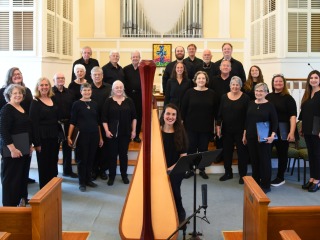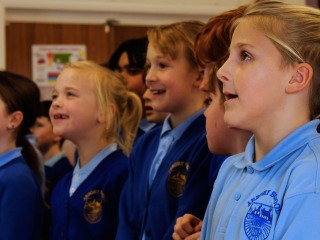MENU
03 May 2013
by Stephen Miller
My dear Deemster, I also received Johnson's circular by last night’s post.
So wrote Dr John Clague in a letter to Deemster J.F. Gill dated 13 December 1894. By circular was meant a prospectus, announcing A.W. Moore’s intention to publish what was then titled Manx Ballads and Songs but which would eventually be issued as Manx Ballads and Music in 1896. Moore was seeking subscriptions to finance the publication rather than simply announcing that it was forthcoming. There is no surviving copy of the prospectus amongst the Deemster’s personal papers now deposited in the MNHL. Presumably, given his own interest in Manx folk song, he was a subscriber but Manx Ballads and Music does not, unfortunately, contain a list of such names denying us an insight into just who was in this period was sufficiently interested enough to sign up in advance of its publication. Fortunately, the MNHL has a number of copies of the prospectus found inserted into duplicate copies of Manx Ballads and Music. The prospectus was to have more of an impact than Moore ever imagined amongst the circle of collectors who emerged in the 1890s, namely Clague and the Gill Brothers. Moore had started work on the book as early as 1891, as a letter written to G.W. Wood that same year shows where he mentions that “I intend publishing the manx [sic] ballads shortly.” It was not the length of time taken by Moore to collect and edit the material for Manx Ballads and Music that led to the book being published later in 1896—rather, it was Moore’s choice of the Johnson Brothers in Douglas as printers that led to its delay. They were jobbing printers, more used to printing stationery than setting and binding a book and so a curious choice: there was also the issue of engraving the music plates, work that had to be sent off the Island. Revisions and corrections required them to be engraved afresh and so would contribute to the lengthy gestation of the book. Moore was to complain on several occasions to Wood about the tardiness of the Johnsons as seen here from September 1895:
As to the book of ballads I am in despair. It ought to have been issued months ago, but up to the present Johnson has only succeeded in printing 30 pages of it! He has quite surpassed himself in dilatoriness & I have really given the whole thing up. I have told him that I do not expect to live to see it through! This does not result from any want of pushing on my part. I send for proofs every day!
In November, "Johnson has succeeded in printing 40 pages of my Manx ballads in the course of a year!" And the next year, 1896: "My Manx ballads & tunes are progressing slowly. I hope it will be issued by July, but I doubt it!" Clague’s letter continued, "I was astonished to find that Moore has 30 pieces." This was a reference to the announcement in the prospectus that some sixty songs would appear and "[n]early half of these Ballads will be accompanied by Old Manx Tunes, of which, including Dance Tunes, there are thirty in all." Clague was surprised at the number of tunes that Moore had in his hands and the question arises to why this was so. He could not have been unaware that Moore had been collecting in the Island, though through a network of helpers, especially as Annie Gell, the daughter of the Attorney General, and a Castletown resident herself, was involved. His surprise seems not to be that Moore had access to tunes but that he had so many to hand—or rather, so many that he was willing to publish. This leads to the question as to the size of his own collection at the time. That there was one in existence is shown by Moore seeking to gain access to it in 1891, using Wood’s wife as a go-between: "I shall be anxious to hear if Mrs Wood succeeded in extracting the songs from Dr Clague," he wrote to her husband in September that year. She was not to be successful, Moore writing somewhat candidly, "Please also thank Mrs Wood for her gallant efforts on my behalf. If she has failed with Dr Clague I fear there is no hope. It certainly seems a dog in the manger policy in his part, as he will never publish anything." A.P. Graves mentions that Clague had a collection to hand by as early as the mid-1870s. Graves was a schools inspector and found the Island was part of his area of inspection (somehow attached to the Manchester office) and on the occasion of his visit in 1875, he recalled that:
At Cronk y Voddy I fi rst heard Manx songs sung in Manx by the school children, and that set me upon an inquiry into Manx Folk Music. I was informed that Dr Clague of Castletown had made a collection of it and to him I went, but without much satisfaction. Another musical enquirer, no less a one than ap Thomas, the famous Welsh harper, had induced the Doctor to lend him some of his precious airs with a view to producing them at his concerts. He lost them instead, much to Dr Clague’s disgust, and the Doctor politely declined to venture another consignment of his country’s airs into the hands of a foreigner.
This must have been collected recently as Clague only returned to the Island in 1873, after completing his medical studies in London and living on the family farm at Ballanorris. The Clague Collection comprising of four tune books is now in the MNHL, but is poorly annotated as regards dates of collecting. Whether it incorporates or not the material in his hands in the 1870s is a moot point and one difficult to answer. That it contains material collected earlier than Clague’s fieldwork at the time of his collaboration with the Gill Brothers is clear from tunes noted down from Henry Clague, his own father, who died in 1883. However, to date, we still do not have an idea as the size of Clague’s collection in 1891, the year when Moore sought access, bar his own surprise from the size of that assembled by Moore that his was not perhaps that great in comparison. What became Manx National Songs was planned in the summer of 1894, the outcome of a meeting between both of the Gill Brothers and Clague, as W.H. Gill recalled in 1898 in Manx National Music:
In the Summer of 1894 I was invited by my colleagues, as stated in the Preface, to help them in carrying out a project which had been formed many years ago and had since been often discussed by them, viz., to collect and preserve from the oblivion into which it was rapidly passing all that remained of the national music of the Isle of Man […].
The question here is whether any collecting was ever intended or if the Clague Collection as then was would be the basis for any publication envisaged. W.H. Gill wrote in 1896 that "I had, at the outset, gone to the island in the hope of being able to gather for myself material at fi rst-hand; but, alas, I was doomed to disappointment. Everybody said it was too late." As ever, the doom laden statement as regards the strength of vernacular culture followed (again, as ever) by the writer then being able to step in at the last minute and save what there was to be saved:
A subsequent visit to the island a few weeks ago [ie, 1895] has resulted in a success far exceeding my most sanguine expectations and in a very considerable addition to my original collection. With the assistance of my brother, and the kind cooperation of many local friends, we had the good fortune to interview in different parts of the Island quite a goodly number of old Manxmen of ages ranging from sixty-five to eighty-four, all more or less musically gifted and some of whom had in their younger days enjoyed a local reputation as singers in church, chapel, farmhouse or inn, as the case may be.
It was the Deemster himself who was behind the Gill Brothers going song collecting and not his brother, William Henry, despite what he wrote as above as a letter here shows— "Your last proposal ab[ou]t music hunting sounds charming. We must think it over." This closes the letter that W.H. Gill sent to his brother on 24 February 1895. We lack the letters from the Deemster so we cannot read exactly what it was that he was proposing and why which is the more interesting point. The Deemster had been sent names of singers as early as October 1894 by Clague. In a letter from March 1895, W.H. Gill wrote "I am hard at work hammering at the rest of the material in hand. Is there any chance of increasing it [unreadable] before M’s book comes out?" It is difficult it must be stated to see just what eff ect the prospectus for Manx Ballads and Music had on the Gill Brothers and Clague, if it was indeed behind the bout of field collecting that all three became involved in during 1895, and later on. The history of folk song collecting in the Island is a complex one: that the 1890s saw four principal organising collectors is remarkable given its size, let alone those that followed after in the shape of Sophia Morrison and her own circle. In one way, the prospectus is a piece of printed ephemera, designed for a short life due to the specific nature of what lay behind its issuing. However, as seen here, it was to have an effect well beyond its purpose. It can also be used to raise questions such as the size of the Clague collection at the time of its circulation. Often more questions are raised than can be answered at present but that is part of the study of the collecting of vernacular culture in this period, answering what we can and laying down those questions that remain to be dealt with through further research. We need to move beyond a history that sees the recording of Manx cultural expressive forms as a single and simple interaction between collector and informant—this is a limiting model and does not show other parties involved nor, and more crucially, the interaction between collectors themselves. For example, the shape of what was to become Manx Ballads and Music was due to the refusal of the Rev. T.E. Brown to produce texts in Anglo-Manx to sit alongside texts collected in Manx. It is suggested here that the simple issuing of a prospectus for Manx Ballads and Songs caused the Gill Brothers and Clague to embark on field collecting beyond their initial aims. "Meanwhile I am longing for another voyage of discovery in the Summer." So wrote W.H. Gill in 1895, seeking to arrange a second tour of collecting in the Island that year, showing it is suggested here the impact that the prospectus for Manx Ballads and Songs had on him and his brother as well as Clague.

Paid performance opportunity: ‘Cree’ Manx language and song project
30 Jun 2025
Read More...
This Fair Isle: Manx music arranged by Kevin Kelly
04 Jun 2025
Read More...
School celebrated in new Manx film
04 Jun 2025
Read More...
Contact, Links, Acknowledgements, Privacy
© Culture Vannin. Culture Vannin is the trading name for the Manx Heritage Foundation, registered charity 333 in the Isle of Man. Designed by 3 Legs Ltd.